
Predicted changes in seawater chemistry resulting from climate change will affect all marine life, including the microbial dynamics and biogeochemical cycling in the ocean. In deep-sea ecosystems, cold-water corals (CWC) are bioengineer species considered vulnerable to such threats. Due to their heterotrophic feeding, broadly limited in nitrogen and carbon supply, these organisms rely on their microbial consortium to ensure their nutrition and health.
EXPL/CTA-AMB/1294/2021
Fundação para a Ciência e a Tecnologia
01/01/2022 to 31/12/2023
We lead the CORHOLOA project, all packages.
Departamento de Oceanografia e Pescas
Rua Prof. Doutor Frederico Machado, 4
9901-862 Horta, Portugal